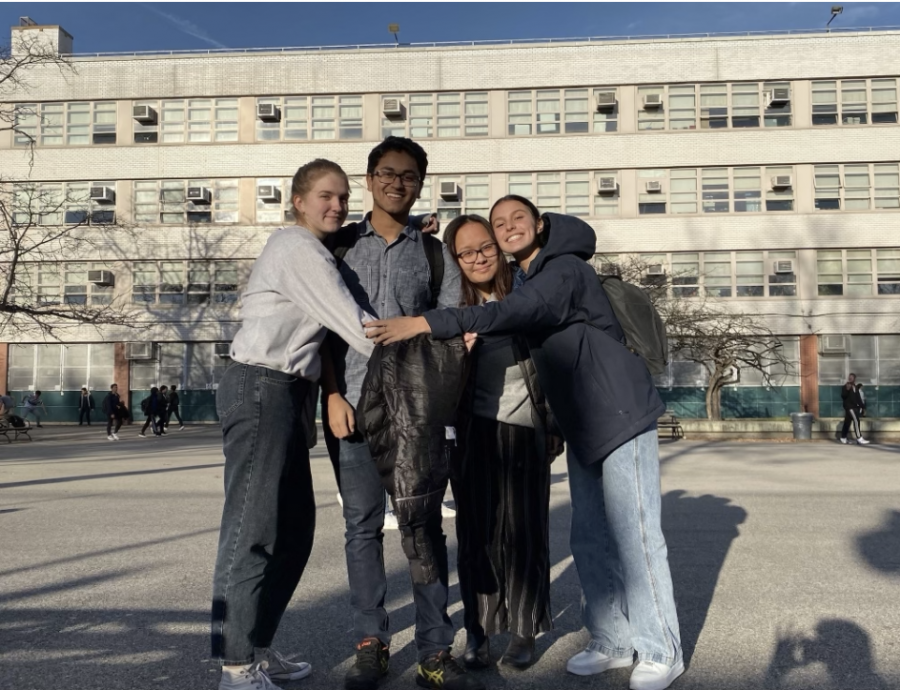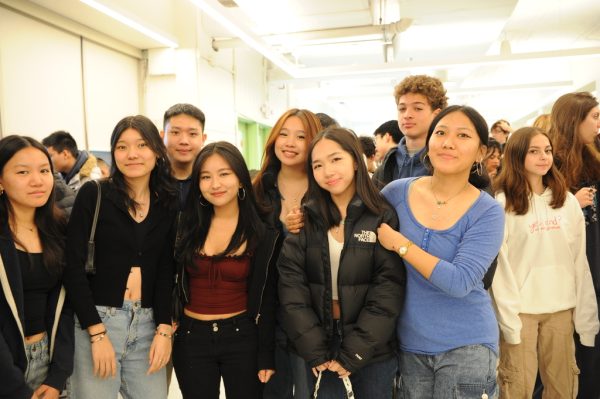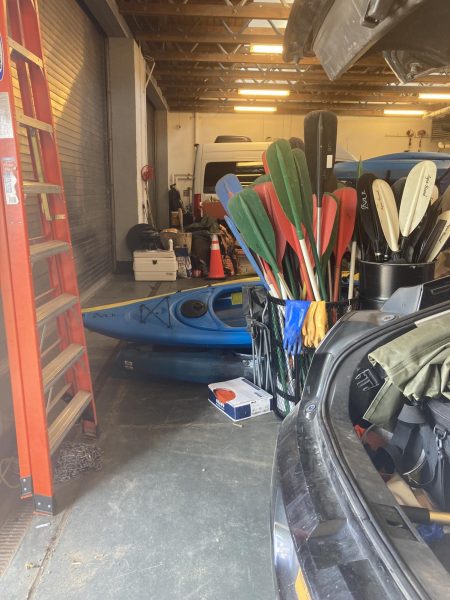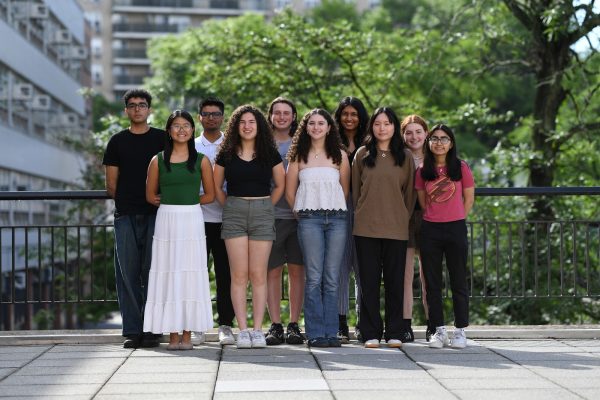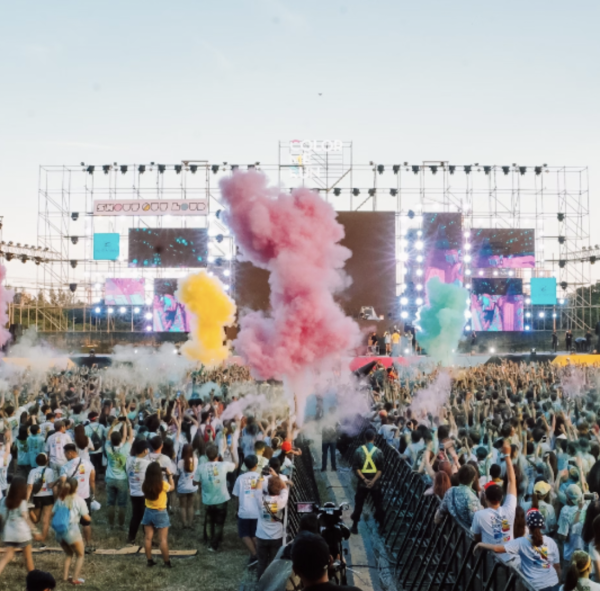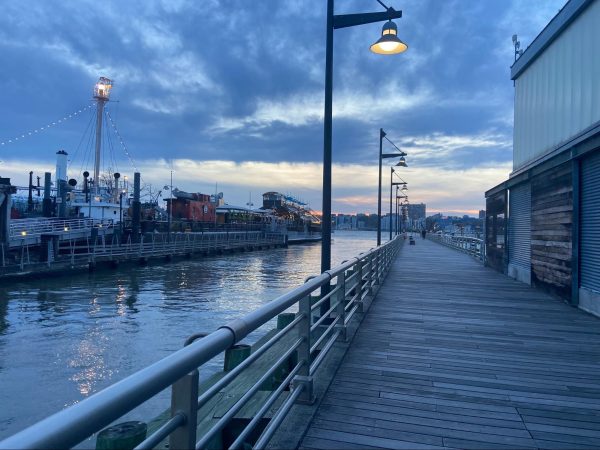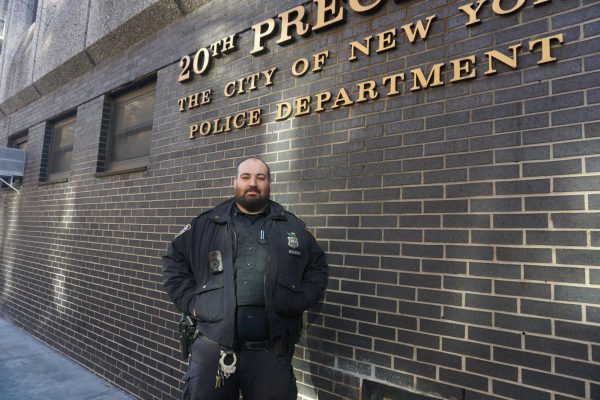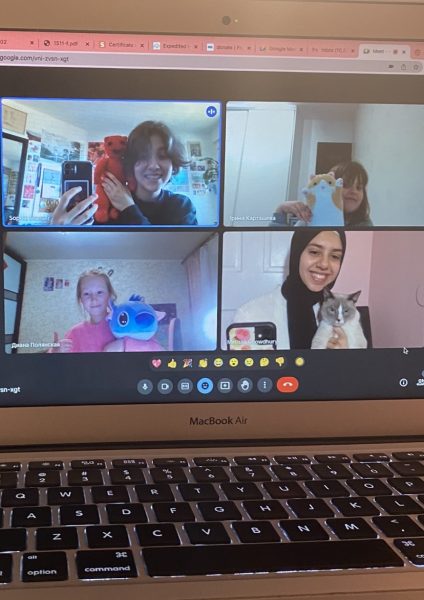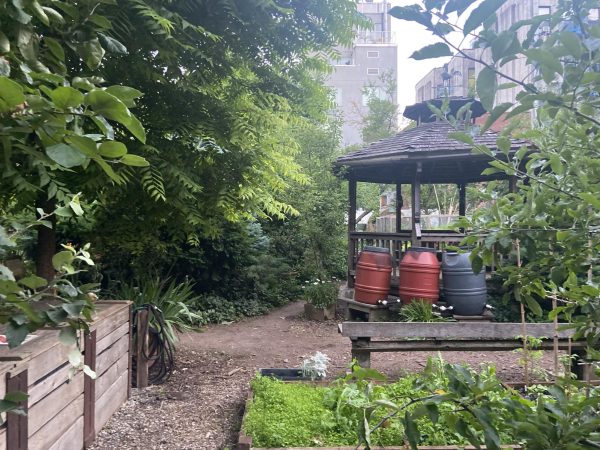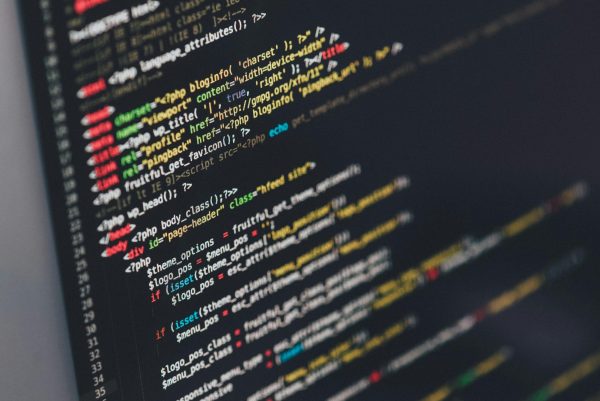How Four Bronx Science Seniors Seek To Utilize A Historic Activity: The Story of ‘Debate For Change’
‘Debate For Change’ was a tournament established as a platform for social justice reform; now it is becoming an annual tradition.
The four Public Forum debate captains’ astounding chemistry stems from their close friendship. (From left to right: Kate Reynolds, ‘21 , Ayanava Ganguly, ‘21 , Tenzin Dadak, ‘21, Aerin Mann, ‘21). Note that this photograph was taken before the Coronavirus pandemic.
The Bronx Science Speech and Debate Team is one of the most historic and heralded debate teams in the country. However, historically speaking, Speech and Debate teams nationwide have never been the most welcoming for minorities and members of marginalized communities. Our very own Public Forum Debate captains are looking to change that, however, as they set up their second annual ‘Debate for Change’ tournament.
Ayanava Ganguly ’21, Tenzin Dadak ’21, Aerin Mann ’21, and Kate Reynolds ’21 have all been on the team since their ninth grade year. Throughout their four years, they have led highly successful debate careers competing at the Tournament of Champions, placing in prestigious tournaments like Harvard and Princeton, and, most impressively, creating ‘Debate for Change.’
Ayanava Ganguly touched on how the idea came into existence saying, “During 2020’s protests for racial justice, I watched a collective movement grow through the actions of individuals; artists produced artwork, musicians composed music, designers fashioned clothing, all contributing the way they knew best… Our idea? An online fundraising tournament, a marriage of the activity my high school life revolves around, and the belief that I actually can contribute meaningfully. From there, ‘Debate for Change’ was born.”
Participants of the tournament must pay a $10 entry fee with all proceeds going to a charity supporting racial justice. Last year, the tournament raised over $2,500, which was donated to “We the Protestors”, an organization focused on combating police violence and racism. Kate Reynolds, ’21, discussed the process of choosing a charity, explaining, “We wanted to choose a charity that reflected our belief in the Black Lives Matter movement and the need for wide-reaching, progressive changes in the criminal justice and policing systems.” The group conducted a lot of research on multiple charities and this year chose ‘National Black Trans Advocacy Coalition,’ a charity focusing on reducing health, living, and employment inequalities for the African-American transgender community.
What is perhaps most impressive about this entire process is that the numerous responsibilities of setting up and running a debate tournament fell primarily on the shoulders of four Bronx Science students. Most tournaments are run by colleges or high schools — institutions that have access to funds and a large number of volunteers. While these four were certainly aided by the virtual format of the competition, we cannot discount their hard work in advertising the tournament, choosing a charity, outreaching across their debate network, and monitoring over 40 teams competing simultaneously.
Of course, the work was divided evenly amongst the four captains to ensure efficiency and efficacy. Ayanava worked mainly on registering the tournament and its participants on the debate platform, Tabroom, which is the common medium for organizing competitions in the debate community. Tenzin covered a big portion of outreach, emailing and messaging everyone in her nationwide debate network. The tournament became so widespread last year that now teams actually email her asking to participate. Aerin took care of the other side of outreach: social media. She advertised the tournament on platforms and raised awareness towards the goal of ‘Debate for Change.’ Finally, Kate undertook the task of researching charities to whom the proceeds would be donated.
While Kate’s job may seem like the main principle of the tournament, there exists another underlying mission of ‘Debate For Change.’ Debate as an activity is advertised as one that promotes positive forward-thinking discourse. However, in practice that is far from the truth. As Ganguly puts it, “in the high school debate community nationwide, the racial inequities that are pervasive in the rest of life are still present, so there is certainly much progress left to be made in terms of addressing those.”
On top of that, many debaters agree that the other major problem with the activity is that the very topics presented in rounds are desensitized to the debaters because of the competition itself. Aerin Mann, ’21, said, “the danger of debate is that we talk about important issues and sometimes use abstract statistics desensitizing us to the issues at hand. I think where the activity loses its ability to make a change is when we just move on from topics without remembering the impact or the importance of them.” When the deaths, daily struggles, and trauma of those being impacted by the topic just become part of a strategy to win that round, that is when debate becomes counterproductive.
So while on the surface the goal of the tournament is to fundraise for a charity addressing racial inequality, ‘Debate For Change’ has a secondary purpose, to create productive discourse in the Debate space. These four debate captains hope to create an annual tradition that promotes a safe and equitable environment for all identities that also recognizes the importance of the topics being debated.
Unfortunately, high school does not last forever and these four will move onto bigger things in college this fall. Kate, Aerin, Ayanava, and Tenzin’s final responsibilities as the founders of this tournament will be passed onto the next generation of debaters. The PF captains have a great relationship with their younger teammates and Tenzin Dadak, ’21, said, “The PF squad knows a lot about ‘Debate for Change,’ and we always talk about how the responsibility is on them to continue the tournament. It’s something the younger debaters look forward to, and I have full faith that I’m leaving it in good hands.” For the next generation of captains, it has become a privilege for them to run this tournament and they realize the importance of passing the torch along.
The tournament takes place on May 3rd, 2021 and all the information regarding events, charities, and registration links can be found on the tournament’s Instagram page: @debateforchange2021. Even if you do not debate or want to participate, ‘Debate For Change’ as a platform is definitely worth checking out!
“During 2020’s protests for racial justice, I watched a collective movement grow through the actions of individuals; artists produced artwork, musicians composed music, designers fashioned clothing, all contributing the way they knew best… Our idea? An online fundraising tournament, a marriage of the activity my high school life revolves around, and the belief that I actually can contribute meaningfully. From there, ‘Debate for Change’ was born,” said Ayanava Ganguly ’21.
Gabriel Lipschutz is a Staff Reporter for 'The Science Survey.' He enjoys telling unknown stories and writing opinionated pieces, valuing both the place...

